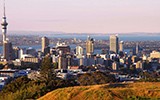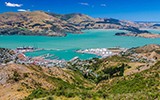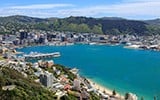Wellington is the capital of New Zealand. As well as being the seat of the New Zealand Government, it is also home to a wide ...
Living in New Zealand guide for expats
All the information you need to relocate and live in New Zealand.
Our selection of articles for expatriation in New Zealand
Christchurch, or Chch, as the locals like to say, is one of the major South Island cities in New Zealand. It is the capital of ...
Located in the Waikato region, just over 100 kilometers from Auckland, Hamilton is a city on the rise. It is the fourth largest ...
Dunedin is one of New Zealand's most iconic cities, and it is becoming increasingly popular with expatriates due to its ...
Whatever your lifestyle and living preference, you can find a place that suits you in the wide-ranging and diverse city that is ...
Being New Zealand's biggest city means that Auckland has the most opportunities for employment but also the most competition ...
As a bustling center of commerce and finance, there are plenty of businesses in Auckland looking for experienced and enthusiastic ...
Aucklanders tend to take their work seriously but also enjoy a fun and supportive environment. If you're concerned about how ...
New Zealand has a large economy that requires an extensive workforce. This, combined with a relatively small population, means ...
If you are looking to settle in Auckland, but can't afford the ever-inflating prices, then Hamilton - or “the ...
New Zealand has a unique Accident Compensation Corporation (ACC) system available to all New Zealand citizens, residents and ...
Expecting a baby in New Zealand can be a wonderful experience, with a high standard of maternal and infant care, as well as a ...
New Zealand's healthcare system is a complicated one, relying on both a public health system and a private health system. To ...
New Zealand is ranked as one of the best countries in the world to start a business in. Indeed, for several years in a row, the ...
You may not want to jump straight into buying a house or finding a long-term rental when you arrive in New Zealand. The best ...
About New Zealand
Aptly known as Aotearoa (land of the long white cloud) to the Māori, New Zealand stretches over 260,000km² with over 15,000km of coastline, the 9th longest coastline in the world.
Even though Auckland is the most populated city, New Zealand's capital is Wellington, located at the bottom of the South Island. This is also where the government is based. Auckland is the largest city with 1.673 million people (almost a third of the population!).
The demography of New Zealand
Over 4.9 million people call New Zealand home, with roughly a quarter of Kiwis born overseas, according to the most recent census. A range of ethnicities calls New Zealand home, including Māori, Pacific Islanders, Europeans and Asians. There are three official languages in the country - English, Māori and New Zealand Sign Language. English is the most widely spoken, with Maori, Samoan and Hindi being spoken by some communities.
New Zealand economy
New Zealand ranks among the easiest countries in the world to start a business in. It has also been rated the fifth freest economy in the world. Economically, New Zealand has not been immune to the impact of the global pandemic. Still, when compared to many other countries, New Zealand has done relatively well, aided by government support, strong exports, and domestic spending. One of the outcomes of the pandemic has been big labor shortages in New Zealand, meaning this could be a great time to move if your industry is one of those most impacted.
New Zealand is known for its agricultural industries, but tourism and construction have quickly become two main industries. As of 2022, New Zealand's GDP is 375 billion New Zealand dollars.
Politics in New Zealand
New Zealand is a constitutional monarchy. This means it has a democratically elected House of Representatives who advise the head of the State (Prime minister). The Queen represents New Zealand. However, the Queen's head of state duties are carried out by a representative within New Zealand, called the Governor-General. The Governor-General is appointed by the Prime Minister and is currently Rt Hon Dame Cindy Kiro.
The House of Representatives (Government) is typically made up of 12 Members of Parliament, or MPs. They are elected every three years by a mixed-member proportional representation voting system. Everyone gets two votes -one for their local MP, the other for their preferred political party. The party wins by getting the highest number of seats in the House of Representatives - the winning local MPs receive those seats, followed by other party members. In 2020, New Zealand's Labour Party, led by Prime Minister Jacinda Ardern, won the election in a landslide victory against the National Party (then led by Judith Collins). Jacinda Ardern resigned in early 2023 and was succeeded by Chris Hipkins as Prime Minister. The next election will take place in October 2023, with Chris Hipkins and Christopher Luxon of the National Party going head-to-head.
New Zealand's climate
New Zealand is located in the Southern Hemisphere, which means summer is from December to February. Auckland and the upper North Island are closer to the equator, indicating a warmer climate, whereas the Deep South of the South Island is closer to Antarctica and much colder. Temperatures range from 20-30º Celsius, while in winter - from June to September - New Zealand has temperatures ranging from 0-15º Celsius.
Due to the geography of the country, the climate is strongly affected by the sea and mountains. The north is almost sub-tropical. Wellington has a more maritime climate, and the South Island has large temperature ranges and snowfall throughout winter. New Zealand gets more sunshine per year than Europe, but with the ozone hole above the North Island, you will need sun cream all day.
Latest job offers in New Zealand












